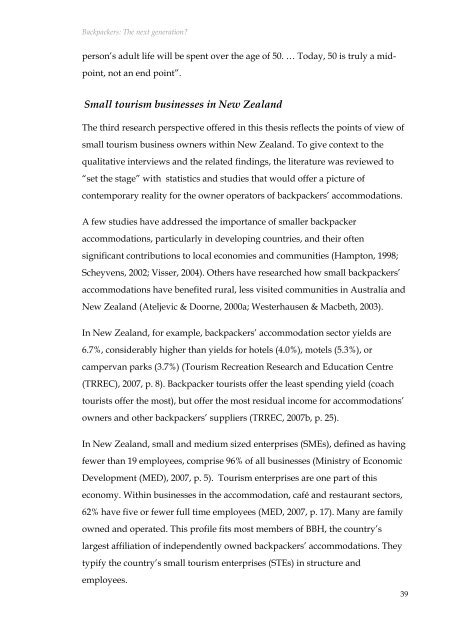Backpackers: The next generation? - Scholarly Commons Home
Backpackers: The next generation? - Scholarly Commons Home
Backpackers: The next generation? - Scholarly Commons Home
Create successful ePaper yourself
Turn your PDF publications into a flip-book with our unique Google optimized e-Paper software.
<strong>Backpackers</strong>: <strong>The</strong> <strong>next</strong> <strong>generation</strong>?<br />
person’s adult life will be spent over the age of 50. … Today, 50 is truly a mid-<br />
point, not an end point”.<br />
Small tourism businesses in New Zealand<br />
<strong>The</strong> third research perspective offered in this thesis reflects the points of view of<br />
small tourism business owners within New Zealand. To give context to the<br />
qualitative interviews and the related findings, the literature was reviewed to<br />
“set the stage” with statistics and studies that would offer a picture of<br />
contemporary reality for the owner operators of backpackers’ accommodations.<br />
A few studies have addressed the importance of smaller backpacker<br />
accommodations, particularly in developing countries, and their often<br />
significant contributions to local economies and communities (Hampton, 1998;<br />
Scheyvens, 2002; Visser, 2004). Others have researched how small backpackers’<br />
accommodations have benefited rural, less visited communities in Australia and<br />
New Zealand (Ateljevic & Doorne, 2000a; Westerhausen & Macbeth, 2003).<br />
In New Zealand, for example, backpackers’ accommodation sector yields are<br />
6.7%, considerably higher than yields for hotels (4.0%), motels (5.3%), or<br />
campervan parks (3.7%) (Tourism Recreation Research and Education Centre<br />
(TRREC), 2007, p. 8). Backpacker tourists offer the least spending yield (coach<br />
tourists offer the most), but offer the most residual income for accommodations’<br />
owners and other backpackers’ suppliers (TRREC, 2007b, p. 25).<br />
In New Zealand, small and medium sized enterprises (SMEs), defined as having<br />
fewer than 19 employees, comprise 96% of all businesses (Ministry of Economic<br />
Development (MED), 2007, p. 5). Tourism enterprises are one part of this<br />
economy. Within businesses in the accommodation, café and restaurant sectors,<br />
62% have five or fewer full time employees (MED, 2007, p. 17). Many are family<br />
owned and operated. This profile fits most members of BBH, the country’s<br />
largest affiliation of independently owned backpackers’ accommodations. <strong>The</strong>y<br />
typify the country’s small tourism enterprises (STEs) in structure and<br />
employees.<br />
39

















